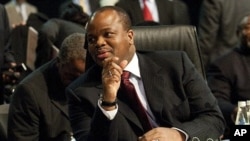This week, Swaziland is holding a public forum, called the Smart Partnership Movement Dialogue, in an effort to solve the nation’s economic and political problems.
The Dialogues are an initiative used in some Commonwealth countries that brings together heads of state and government, business and labor.
However, in the case of Swaziland, labor unions and civil society are boycotting the talks. They claim the government has paid for them, and is using them as “window dressing” to prevent democratization and reward allies of the state.
Martin Dlamini, the head of Swaziland’s Smart Partnership Secretariat, denies the charge. He says the talks were sponsored by private institutions which have contributed over $135,000 to the event.
“The aim of the talks is really to look into the strategies that have been drawn up by government … to revive our economy and to improve cash flow,” said Dlamini. “We have been hard hit by the economic recession that has taken place all over the world and the fall of [government] revenue. So, we are coming up as a nation to see what we can do [to help the situation].”
The two-day dialogue, which ends Thursday in Manzini, was aimed to help the administration resolve the country’s fiscal and financial problems.
Dlamini said the talks will consider suggestions from officials of the government and the general public.
He adds that the dialogue enables the government to gather information on how best to address concerns of citizens as well as to resolve problems the country faces.
Critics accuse the government of failing to come up with democratic policies to address the ailing economy. They also demand a democratic government saying that Swazis deserve to be able to choose their own leaders.
But, Dlamini denies a majority of the population want change. He calls those demanding democracy as a few people making “loud noise.”
“A lot of Swazis are saying they want to continue peacefully, we do not want change in this country, because we are happy with what we have,” said Dlamini. “Any change that comes must come through consensus and consultation, as we are trying to do through the smart partnership process.”
Civil society groups, political activists and union workers boycotted the dialogue after accusing the government of repeatedly of failing to implement suggestions from previous events.
Analysts say although a constitution was reintroduced in Swaziland, the power invested in King Mswati III make the country in effect an absolute monarchy.
Critics say the government has successfully stifled political opposition by putting pressure on human rights organizations, trade unions, and civil society groups and banned all political parties.









